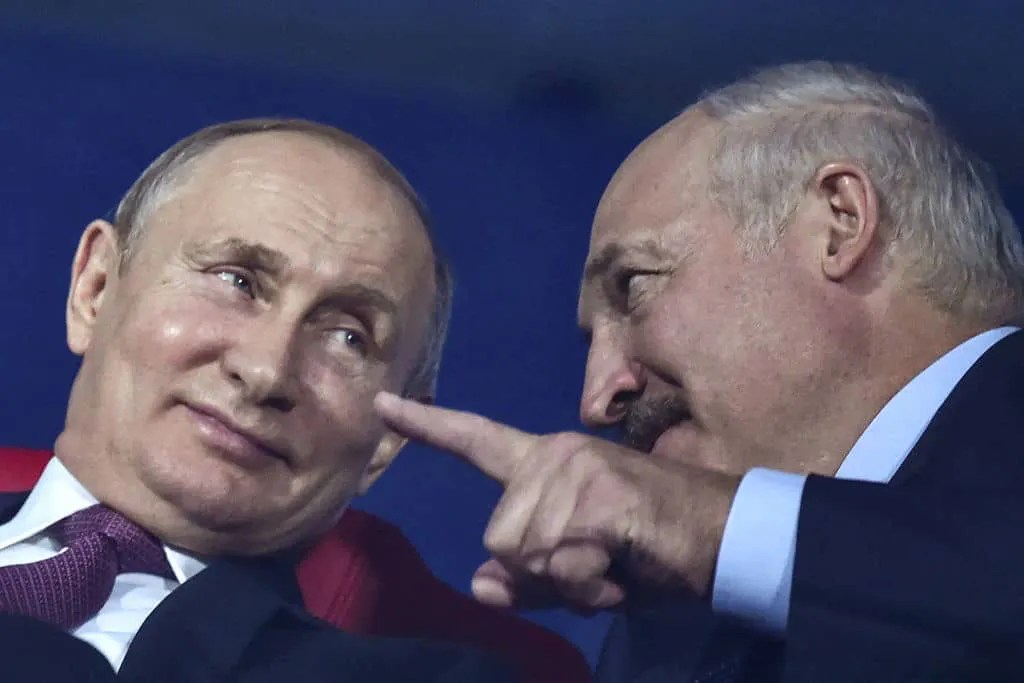Belarus’s president Aleksandr Lukashenko has been missing from public view since being taken ill during a Victory Day parade in Moscow on 9 May. If Belarus’s dictator dies or is incapacitated Vladimir Putin – his neighbour, patron and only regional ally – will have a vast, even existential, problem on his hands.
It was mass protests in Belarus’ capital Minsk in August 2020 after an election widely seen as stolen by Lukashenko that prompted Putin to decide that the West was irrevocably hostile to the Kremlin and was hell bent on fomenting regime change across the former Soviet Union – including in Russia itself.
To Putin and his inner circle of ex-KGB colleagues – notably Security Council Secretary Nikolai Patrushev and Federal Security Service head Aleksandr Bortnikov – the Minsk protests were, like the Maidan revolution that brought down a pro-Moscow leader in Kyiv in 2014, entirely directed and produced by Washington. Lukashenko narrowly survived the 2020 revolt, aided by lots of Russian brute force and only after arresting tens of thousands of protestors who were systematically beaten, raped and tortured. But the chain of events that led Putin to invade Ukraine was directly triggered by fear that supposedly western-backed people-power protests that had so nearly toppled Lukashenko could be repeated in Moscow.
The problem for Putin is that the 68-year-old Lukashenko, like Putin himself, has no obvious successor. The wily former collective farm manager has been in power since 1994, and Lukashenko’s personal rule and image have become the central, even sole, foundation of his regime. Without ‘Batka’ – ‘little father,’ the nickname given to orthodox priests and to the Tsar – the Minsk regime has little legitimacy. And unlike in Russia, there is a clear opposition leader waiting in the wings to take power: Svitlana Tikhanouskaya, the presumed winner of the 2020 elections, who fled to neighbouring Lithuania and heads an active opposition council recognised by the Lithuanians as an official government-in-exile.
Rumours of Lukashenko’s ill health means only one thing: ‘We should be well prepared for every scenario,’ Tikhanouskaya tweeted on Sunday. ‘To turn Belarus on the path to democracy and prevent Russia from interfering we need the international community to be proactive and fast.’
Two days ago open-source researchers tracked a Russian government private jet usually used by senior officials from Moscow to Minsk – probably for crisis talks. But Putin’s options for intervention are limited, and all carry serious danger for his own regime. If, as seems likely, mass protests break out after Lukashenko dies or leaves the political scene, demonstrations will be much harder to contain than in 2020 because the Belarusian state’s forces will have no clear leader. Putin could – and probably will – try to crush the rebellion and support a successor agreed between Moscow and the Lukashenko’s cronies in Minsk. But the Ukraine war has seriously depleted Putin’s security forces, and his military defeats in the field have emboldened Belarus’ opposition.
An even more high risk strategy would be for Putin to formally annexe Belarus – which is, on paper, actually already part of a supranational ‘Union State’ with Russia created by Lukashenko and Boris Yeltsin in 1998. Such a move would, theoretically, be in line with Putin’s message on the eve of the Ukraine invasion of ‘re-uniting the Slavic peoples.’ But again, in practical terms such a move would require a massive investment of Russian security forces, and would be bitterly and violently resisted by the Belarusian opposition. Belarus’ neighbours Poland and Lithuania – both Nato and EU members and leading hawks on Russia – would engage vigorously to prevent a repeat of Lukashenko and Putin’s brutal crushing of democracy in 2020.
At the same time Putin cannot afford to lose Belarus. Though the country of 9.3 million has not formally entered the war against Ukraine, Belarusian territory is a key staging post for Russian attacks on the north-west of the country. And more importantly, a victory for a resolutely pro-European, democratic opposition in Minsk would be a body blow for Putin’s own regime and a fatal setback to his grand project of reviving Russian greatness and influence over its near abroad.
Whatever ails Lukashenko, Putin must be praying that his ally survives. As Ukraine gears up for a major offensive, the last thing that the Kremlin needs is a fresh crisis on its western flank. In a very real sense, Lukashenko’s fate is closely tied with Putin’s own.







Comments